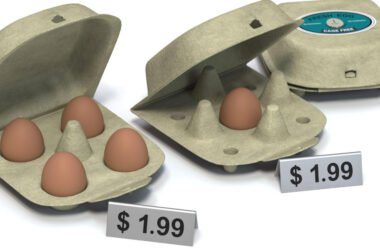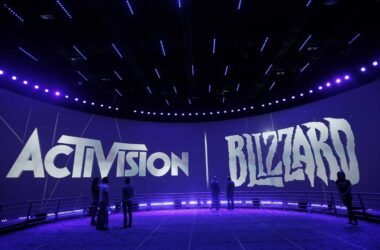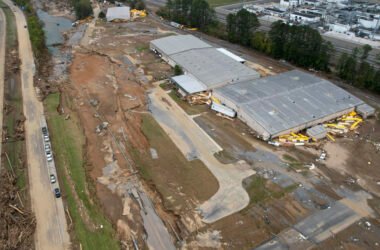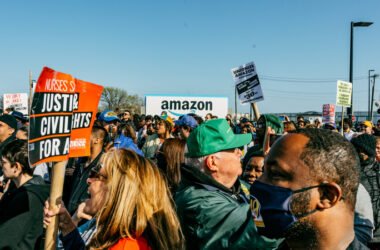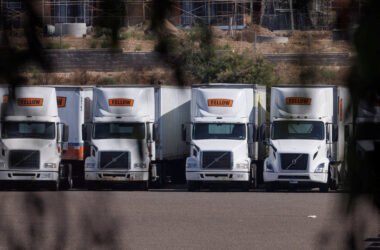The Biden administration has been attempting to kickstart the domestic supply chain for electric vehicles in order to facilitate the production of cleaner cars in the United States. However, the experience of one Texas company, whose plans to contribute to the production of an all-American electric vehicle were disrupted by China, highlights the high stakes involved as the administration finalizes rules governing the industry.
Huntsman Corporation commenced construction two years ago on a $50 million plant in Texas to produce ethylene carbonate, a chemical used in electric vehicle batteries. This facility would have been the sole site in North America manufacturing this product, with the intention of supplying battery factories serving the electric vehicle market.
However, as new facilities in China began operating and inundated the market, the price of the chemical dropped dramatically from $4,000 to $700 per ton. After investing $30 million in the project, the company ceased work on it this year. Peter R. Huntsman, the company’s chief executive, stated, “If we were to start the project up today, we would be hemorrhaging cash. I’d essentially be paying people to take the product.”
The Biden administration is currently finalizing rules that will determine whether companies such as Huntsman will find it lucrative enough to participate in America’s electric vehicle industry. The rules, expected to be proposed this week, will regulate the extent to which foreign companies, particularly those in China, can supply parts and products for American-made vehicles that are eligible to receive billions of dollars in subsidies.
The administration is offering up to $7,500 in tax credits to Americans who purchase electric vehicles, in an effort to boost the industry and reduce the country’s carbon emissions. The rules will determine whether electric vehicle manufacturers seeking to benefit from this program will have the flexibility to obtain inexpensive components from China, or if they will be required to purchase pricier products from U.S.-based firms like Huntsman.
The legislators who drafted the climate bill, including Senator Joe Manchin III, the West Virginia Democrat, included language that disqualifies an electric car from receiving the tax breaks if the critical minerals or other components used in its battery were produced by “a foreign entity of concern.” Lawmakers defined that as any firm owned by, controlled by, or subject to the jurisdiction of North Korea, China, Russia, or Iran.
However, they left it to the Biden administration to clarify key aspects, such as what constitutes a Chinese company and what product qualifies as a “battery component.”
The administration faces a challenging decision with the new rules. If it allows more companies to qualify for the benefits, Americans will have a wider array of low-cost electric vehicles to choose from, ultimately leading to increased adoption of clean cars and aiding in the mitigation of climate change. Additionally, it could help bolster the finances of U.S. automakers that are currently incurring heavy losses from electric vehicle production.
However, such a course of action could undermine the administration’s other priority – to establish more secure supply chains for electric vehicles. The government has sought to utilize the climate law to promote the manufacturing of electric vehicles and their components in the U.S. and allied countries, thereby reducing dependence on China, which dominates the global markets for electric vehicles and their batteries.
Attempts to balance these concerns have triggered conflicts between automakers and parts manufacturers, U.S. miners, and labor unions.
Automakers have been anxiously awaiting the guidelines.
Carmakers such as General Motors and Hyundai, driven by the new climate law, are racing to establish factories in the U.S. to produce batteries and process materials like lithium. However, they are still years away from being able to manufacture an electric vehicle without materials and components from China, as per representatives from the auto industry.
China currently holds a dominant position in the production of materials such as graphite and processed lithium, which are crucial for enabling the flow of electricity within a battery, as well as for the cathodes and anodes, the fundamental building blocks of a battery. Through substantial government subsidies and vast economies of scale, Chinese firms now sell some of the world’s most advanced electric vehicles and their components at significantly lower prices than competitors in other countries.
Automakers are also under immense pressure to minimize costs by sourcing from the most affordable suppliers. Ford Motor reported a $1.3 billion loss on electric vehicles in the third quarter, equating to a loss of $36,000 on every vehicle sold.
In June, Tesla, a company that procures key parts from China, advocated for less stringent restrictions on foreign entities in its comments to the government. Tesla suggested that the restrictions on foreign purchases should be limited to major battery parts, such as the cathode and anode, rather than encompassing the various minerals or other parts utilized in their production.
Albert Gore III, executive director of the Zero Emission Transportation Association, remarked, “In the worst case, you can have vehicles made in the U.S., with the vast majority of parts coming from the U.S., that could be disqualified from the tax credit because a single part comes from China.” Mr. Gore, whose organization includes Tesla and battery makers as members, anticipates the administration to strike a balance.
Conversely, miners and other manufacturers of battery materials and components argue that allowing China to supply cheap parts could result in a flood of foreign products into the U.S. This scenario would essentially relegate the United States to being a mere assembly point for Chinese-made technology and products, rendering the U.S. economy highly vulnerable, they argue.
Thus far, the climate law seems to have stimulated more investment in factories for producing electric vehicles and their batteries than in the mines and facilities responsible for extracting the minerals, chemicals, and smaller components used in the battery itself.
In fact, the lone cobalt mine planned in the United States, owned by Jervois in Idaho, temporarily closed this year. The company attributed this decision to plummeting prices, resulting from a surge in material produced by China. Jervois resumed some exploratory drilling this fall, thanks to new funding from the Defense Department.
As the final rules have yet to be issued, some companies have halted plans for new U.S. investments, recognizing that their business calculations could significantly change in the coming months.
“You’re seeing a bit of a holding pattern until the final guidance is released by the administration,” stated Abigail Seadler Wulf, the vice president and director of critical minerals strategy at Securing America’s Future Energy, a nonprofit organization.
In the absence of government restrictions on the use of Chinese materials, Mr. Huntsman expressed that there would be no incentive to further invest in the company’s Texas project. He emphasized that the Chinese government heavily subsidizes the production of ethylene carbonate, enabling Chinese firms, accounting for 90% of the global production of the chemical, to sell it at exceptionally low prices.
He posed the question, “The question, really, is how does the United States want to respond to this?”
Alan Rappeport contributed reporting.

